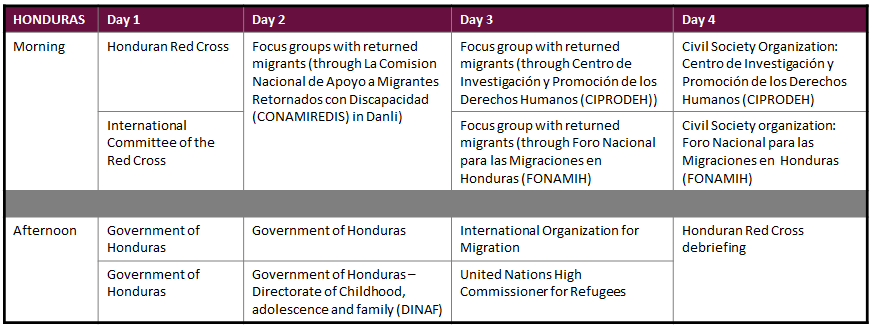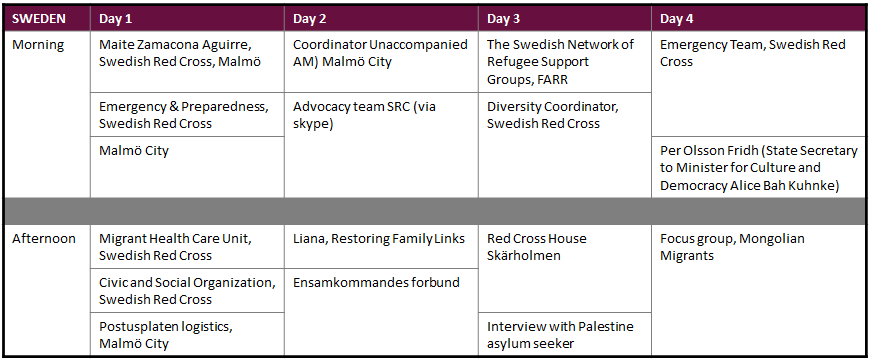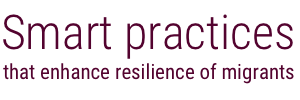Annex B – Methodology
Over three months, Dalberg completed 74 interviews in 30 countries and conducted five country visits.
Number of interviews completed by region.
- Secretariat: 20
- Europe: 22
- America: 8
- MENA: 9
- Africa: 8
- Asia Pacific: 6
88 per cent of these interviews were with actors from within the Red Cross Red Crescent Movement.
We have included the external perspective through desk research and country visits.
Number of organizations met/focus groups held by country:
- Kenya: 10
- Honduras: 13
- Turkey: 6
- Lebanon: 8
- Sweden: 3
Dalberg also conducted extensive desk research of work from some of the other main actors in the area
Johns Hopkins School of Advanced International Studies
UNHCR
- Alternatives to Camps – making it work. Best practice series.
- Protection from Xenophobia: An Evaluation of UNHCRs Regional Office for Southern Africa’s Xenophobia Related Programmes.
- Refugee Livelihoods: A Review of the Evidence.
- Initiatives for Reaching out to Afghan Refugees in Iran.
European Parliament Directorate General for Foreign Policy
International Labour Organization
Urban Refugee Living Programme
Initiative for Migration and Development
Dalberg
- Refugees – A 360 Degree Look at Humanitarian Crisis and a Development Opportunity.
International Organization for Migration
To assess the needs of migrants we relied on various sources of information.
We grouped needs in three categories depending on whether migrants need some, medium, or high levels of external support. The category of the need for support is relative both to other needs in the same step in the trail, and to the same need at other steps in the trail. The figure below provides the legend used:
Some need for external support
Medium need for external support
High need for external support
To collect and categorize the needs for external support we:
1. Developed a set of migrant needs through an iterative process that included desk reviews and interviews
- Interviews with: IFRC staff; National Societies; partners and other actors (UN agencies, civil society organizations); governments
- Interviews/focus groups with migrants (during country visits).
- Desk research.
2. We established the relative importance of external support to fulfilling those needs. In making this assessment we considered both direct input from experts and supporting information (see example on next slide). Questions we used to guide the weighing included (but were not limited to):
- Direct feedback indicators
- How important did the interviewee/desk research qualify the need as?
- How did each need compare to the same need at other steps in the trail?
- How did each need compare to other needs within the same step in the trail?
- Supporting information
- Was the need raised by interviewees without prompting?
- Was this weight supported by other sources? Or were there contradictions? (For example, did migrants in very different situations confirm these assumptions? Or did they have other priorities? For example, were there significant and recurring ways in which migrants can address the need on their own?)
3. We categorized the need for external support into: Some, Medium, and High
4. We validated the findings through further interviews and desk research.
- We completed a total of 74 interviews with people in 30 countries and conducted five country visits where we spoke to 33 different groups of stakeholders, including 13 migrant focus groups (with between 5-15 people each).
Example
Education and vocational training while transitioning through borders is classified as ‘some need for external support’:
- How important did the interviewee/desk research consider the need to be?
- While children, youth and adults are often deprived of education/training while migrating, a desk review and interviewees indicated that migrants do not prioritize studying while travelling (as they focus on safely reaching their destination).
- How did each need compare to the same need at other steps in the trail?
- The need for education was seen as higher before leaving, at migrant camps, during long-term stays, and on return, when migrants could dedicate the necessary time to studying.
- How did each need compare to other needs within the same step in the trail?
- Other needs such as information were rated higher at borders.
- Was the need raised by interviewees without prompting?
- No interviewee said that education/vocational training were a need while transitioning across borders.
- Was this weight supported by other sources? Or were there contradictions?
- No other sources contradicted this rating.
Interview guides – overview
- Dalberg used a semi-structured approach when conducting interviews.
- Team members used interview guides to support the interviews, but were flexible to:
- Change the order or the wording of the questions to ensure the interview was more of a conversation than a formal interview.
- Ask new questions, to further explore and understand concepts shared by the interviewee.
- Bring in relevant insights gathered from the research, to test during the interviews.
- Not ask particularly sensitive questions, as needed (particularly in the case of interviews with migrants).
- The interview guides used are provided below.
Work of National Society in migration
- What are the main activities your organization contributes in the area of migration in this country?
- Who are the main groups of migrants the National Society provides support to?
- What would you describe your key strengths as?
- What are the key challenges you have faced in providing support to migrants?
- Are there any recently planned changes to your work in the country? What and why (if yes)?
- If you could, what else would you add do/what would you do differently?
- How important has migration been to the work of the National Society in the last five years?
- Do you collect any data/indicators on migrants/services you provide for migrants that you can share?
- E.g how many migrants supported? Breakdown on migrant needs.
- What were the key pull factors that draw migrants into this country?
- What are the key push factors that cause migrants to leave this country?
Needs
- What are some of the key migrant needs that have been identified that need to be addressed in this country?
- Which needs has the national society prioritized meeting and why?
- What have been the main barriers to meeting the migration needs in this country?
- Are there any other needs that remain unmet? Why?
Country landscape
- Who are the other key players in migration in the country? What are their key activities?
- How does the government support migration?
- Are there any special government programs in support of migration?
- Is there money allocated by the government specifically to deal with migration?
- What are the central government legislatures in place regarding migration?
- What are the key strengths of the legislatures?
- What are the key challenges the country has faced with regards to migration legislation?
- Are there any regulatory studies/analyses we can refer to?
Smart practices
- Are there any responses you have seen in migration in this country you would describe as smart practice? Which responses and why?
- Detailed description of smart practice
- Who is involved? Since when? What are they doing? What need are they responding to? Why is this a best practice? Have there been any attempts to replicate elsewhere?
- Are there any specific metrics that make you see this as a best practice? (E.g. number of people reached, cost effectiveness.)
- What were the some of the challenges in setting up or implementing this smart practice?
- What have been some of the key lessons learned from implementing this smart practice?
- Detailed description of smart practice
Recommendations
- What recommendations do you have for how the IFRC/National Society can best contribute to the migration situation in the country?
- How can the collaboration between the IFRC/National Society be improved?
- How can the IFRC better support the National Society?
- Is there a collaboration/network/platform to share experiences (or to coordinate action) between sister National Societies?
Interview guide: UN and civil society
Work of organization in migration
- Who are the main groups of migrants your organization provides support to?
- What are the main activities your organization contributes in the area of migration in this country?
- What would you describe your key strengths as?
- What are the key challenges you have faced in providing support to migrants?
- Are there any recently planned changes to your work in the country? What and why (if yes)?
- If you could, what else would you add do/what would you do differently?
Needs
- What are some of the key migrant needs that have been identified that need to be addressed in this country?
- Which needs has your organization prioritized meeting and why?
- What have been the main barriers to meeting the migration needs in this country?
- Are there any other needs that remain unmet? Why? Any recommendations or thoughts on how these unmet needs could be addressed?
Country landscape
- Who are the other key players in migration in the country? What are their key activities?
- How does the government support migration?
- Are there any special government programs in support of migration?
- Is there money allocated by the government specifically to deal with migration?
- What are the central government legislatures in place regarding migration?
- What are the key strengths of the legislatures?
- What are the key challenges the country has faced with regards to migration legislation?
- Are there any regulatory studies/analyses we can refer to?
Smart practices
- Are there any responses you have seen in migration in this country you would describe as smart practice? Which responses and why?
- Detailed description of smart practice
- Who is involved? Since when? What are they doing? What need are they responding to? Why is this a best practice? Have there been any attempts to replicate elsewhere?
- Are there any specific metrics that make you see this as a best practice? (E.g. number of people reached, cost effectiveness.)
- What were the some of the challenges in setting up or implementing this smart practice?
- What have been some of the key lessons learned from implementing this smart practice?
- Detailed description of smart practice
- What recommendations do you have for how the IFRC/National Society can best contribute to the migration situation in the country? To better collaborate and avoid duplication of efforts?
Interview guide: Government actors
External smart practices
- Are there any responses (by international or national actors) you have seen in migration in this country you that are working effectively? Which responses and why?
- Detailed description of smart practice
- Who is involved? Since when? What are they doing? What need are they responding to? Why is this a smart practice? Have there been any attempts to replicate elsewhere?
- Why do you consider this a smart practice? Are there any specific metrics that make you see this as a smart practice? (E.g. number of people reached, cost effectiveness)
- What were the some of the challenges in setting up or implementing this smart practice?
- What have been some of the key lessons learned from implementing this smart practice?
- Detailed description of smart practice
- Are there any responses that these actors are implementing in partnership with the government in migration which is working effectively? [Same sub-questions as above.]
- Are there any other responses the government is implementing that have been particularly effective? E.g., policies, services (education, health).
Needs
- What are some of the key migrant needs that have been identified that need to be addressed in this country?
- Which needs has the government prioritized meeting and why?
- What have been the main barriers to meeting the migration needs in this country?
- Are there any other needs that are currently not being addressed? Why?
Support from external actors
- What type of support would the government find most useful to receive from civil society in migration? Why?
- How could you the IFRC/Red Cross Red Crescent improve collaboration and coordination with the Government in terms of providing assistance to migrants?
Interview guide: Migrant focus groups
Let’s first talk about the start of your journey
- What motivated you to move?
- What were the main issues you faced at the start of your journey?
- What are some things that could have helped you at the start of the journey? (If no ready answer, prompt for money, information, social support, skills support, legal support.)
- Did you receive any help from organizations the start of the journey?
- If yes: Do you remember which ones? How did they help you? Was this support helpful? Why or why not? How could it have been even more helpful?
- If not: Why not? (e.g., answers might be that they were not aware of availability of support, or were worried about consequences, etc.).
- Was there any type of support you were missing/ you wish you could have received? If an organization could give that type of help, how do you think they should give it? (E.g, internet, radio, in person, app, etc.).
Let’s talk about the journey you made:
- What were the main challenges/dangers/risks you faced through it? If no ready answer prompt for:
- How did you select your migration route?
- How did you carry money/other valuables?
- How did you purchase food?
- How did you keep in touch with loved ones?
- What are some key things that it would have been good to know or have during the journey?
- Did you receive any help from organizations during your journey?
- If yes: Do you remember which ones? How did they help you? Was this support helpful? Why or why not? How could it have been even more helpful?
- If not: Why not? (E.g., answers might be that they were not aware of availability of support, or were worried about consequences, etc.).
- Was there any type of support you were missing/ you wish you could have received? If an organization could give that type of help, how do you think they should give it? (E.g., internet, radio, in person, app, etc.).
Let’s talk about your lives now
- What are the main challenges you face on a daily basis?
- Where do you live, and how did you find the place?
- Which communities are you a part of?
- Are you employed?
- Are you in touch with your family?
- Are you receiving any help from organizations?
- If yes: Do you remember which ones? How did they help you? Was this support helpful? Why or why not? How could it have been even more helpful?
- If not: Why not? (e.g., answers might be that they were not aware of availability of support, or were worried about consequences, etc.).
- Do you have access to information about services provided by Red Cross, local actors, government?
- Do you know about your rights and entitlements as a migrant, refugee or trafficking victim?
- Is there any type of support you were missing/ you wish you could have received? If an organization could give that type of help, how do you think they should give it? (E.g., internet, radio, in person, app, etc.)
- Perceptions. How would you describe perceptions of local populations towards migrants, trafficking victims and refugees? Do you face any kind of discrimination when accessing jobs or health, education facilities?
What are your aspirations for the next year? Five years?
Please outline three areas where you think Red Cross support is most needed to improve the lives of migrants and refuges?
Do you have any other thoughts on how the Red Cross can best help you in the future?
For you what does the Red Cross symbolize? What services would you expect them to provide? Have they been present across your journey? If so, have they been providing the same types of services? (Which ones?) What do you think of their services? What do you like? How could they improve their services?
Testing smart practices
- We have heard X as an intervention that helps to support you. (Repeat for all interventions you want to test.)
- Have you experienced a similar intervention?
- Did it work well? Why? Why not?
- If you haven’t, is it something you think would work well? Why? Why not?
- How could it be improved to make it work better?
Agendas of country visits





